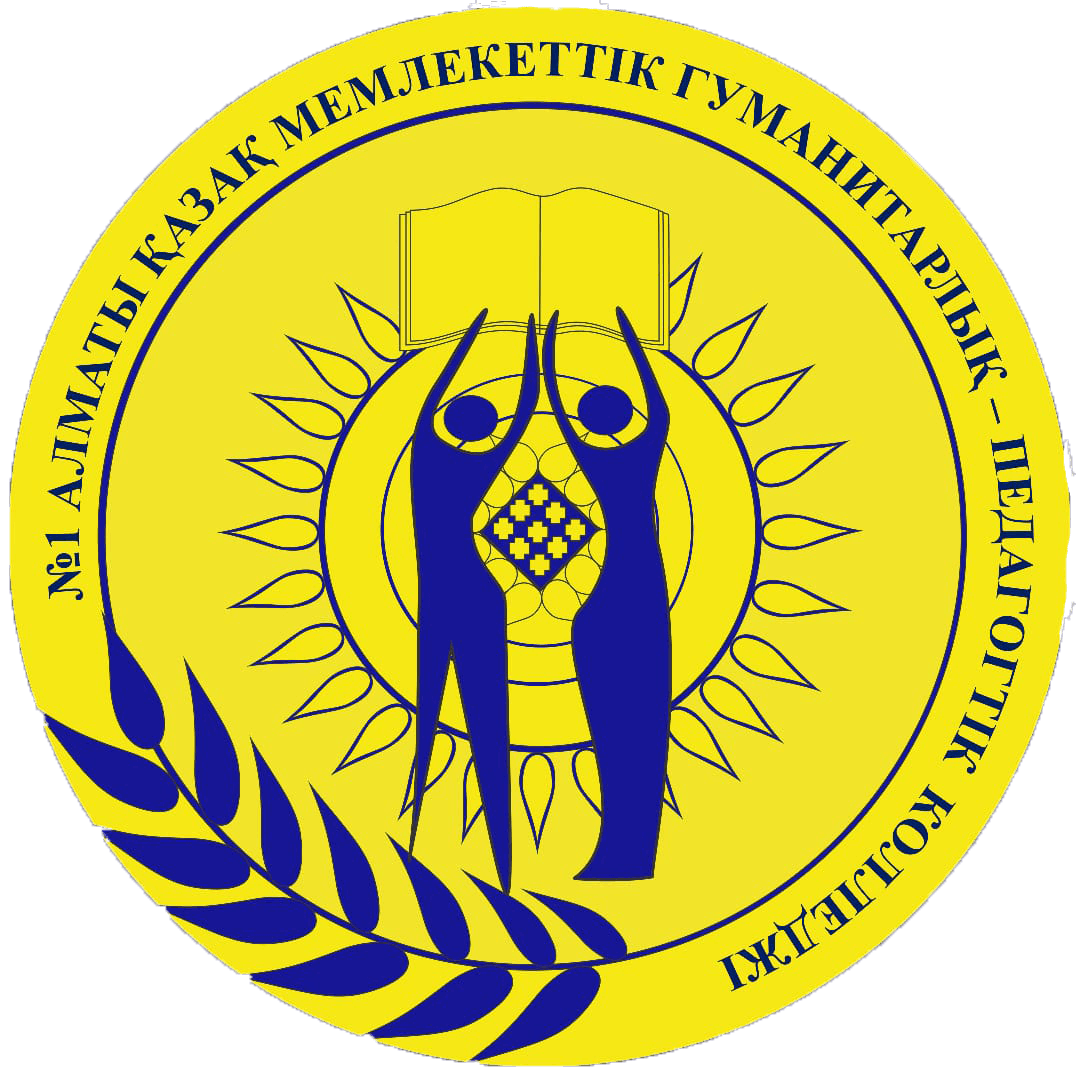|
|
|
Approved
|
|
|
«SANALY URPAQ»within the framework of the project 2023-2024 of Almaty Kazakh State Humanitarian and Pedagogical College No. 1 for the academic year
COMPREHENSIVE WORK PLAN AGAINST COLLATERAL CORRUPTION
№ | Name of the event | Target direction | Name of educational work | Expected result | Responsibles | Due date | |
1 | 2 | 3 | 4 | 5 | 6 | 7 | |
1 department. Anti-corruption education and upbringing of the younger generation | |||||||
1.1 | Carrying out the action "Hour of common sense"., and then distribute them on social networks | Educational and methodological provision of anti-corruption training, Broad interpretation of anti-corruption legislation | Dissemination of campaign results on social networks | To show young people that success can be achieved through honest and non-commercial work through the example of outstanding historical and contemporary figures | College staff, Employees of the BU | in the semester 1 times | |
1.2 | Carrying out a cycle of curatorial hours and open classes on forming an anti-corruption attitude among students, encouraging the formation of anti-corruption behavior | Curatorial hours on formation of anti-corruption worldview of students | Forming intolerance to corruption; demonstrate the ability to fight against corruption; forming the foundations of legal literacy. | Group curators and industrial training masters | each month | ||
1.3 | The best essay among students of technical and vocational secondary education organizations, posters and pictures, video contests, debates, holding discussions | Holding contests | Forming an anti-corruption culture among young people by involving them in anti-corruption activities | Group curators and industrial training masters | in the semester 1 times | ||
1.4 | Revitalizing the work of the volunteer student club "Sanaly Zodla" and accepting new members. | Promotion and support of youth anti-corruption movement | "Conscious generation" | Interaction of young people with each other, formation of interest in participation in public events | Deputy director for technical matters | 2023 September | |
|
| ||||||
1.5 | Organizing meetings with leaders of the youth movement in the format of TedX or pecha-kucha | Arrange a meeting | Deputy director for technical matters | in the semester 1 times | |||
1.6 | Conducting a social survey "Clean Session" among college students | Social survey results | Identification and prevention of corruption risks in educational institutions | Deputy director for technical matters | During the semester 1 times | ||
1.7 | The best tiktok on social networks on the topic of anti-corruption, holding contests for social videos | Influencing people's minds through modern means of communication | Conclusion and award | Encouraging participation in anti-corruption activities through modern opportunities | Deputy director for technical matters | 2024 from | |
1.8 | 9 December - conducting events dedicated to the International Anti-Corruption Day | An overview of the work done to promote the culture of common sense, support activists | Anti-corruption activities with wide publicity in social networks | Informing the public about the work done on the formation of an anti-corruption culture and the promotion of the ideology of common sense | College Director | 2023 from | |
2 department. Promotion of anti-corruption culture among employees of technical and vocational education organizations | |||||||
2.1 | "Sanaly urpaq" of college staff, with representatives of the project offices of "Adaldyk alany"., holding a meeting with a special monitoring group and representatives of the educational and propaganda headquarters | Interpretation of anti-corruption legislation | Arrange a meeting | To manifestations of corruption “total intolerance” help to form | College Director | in the semester 1 times | |
2.2 | Conducting seminars and trainings for teachers on anti-corruption training | Manifestations of corruption among employees, including organization of work on formation of negative attitude to receiving gifts related to the performance of official duties | Seminar-trainings for teaching staff | Influencing college staff by enhancing anti-corruption and legal culture | Deputy director for technical matters | On a permanent basis | |
2.3 | Publication of articles in electronic and print media on the formation of intolerance of corruption among young people | Publication of articles in electronic and print media | Promotion of anti-corruption work | College staff | On a permanent basis | ||
2.4 | Monitoring compliance with the organization's anti-corruption standard and academic integrity code
| Analysis and monitoring of the implementation of the anti-corruption standard | Compliance with anti-corruption standards | College Director | each month | ||
3 department. Activities of a general nature | |||||||
3.1 | Plans for financial activities of the organization on their sites, report posting | Ensuring transparency of spending budget funds | Placing a report on financial activity on the organization's website | Ensuring openness and transparency of college activities | College Director | stable | |
3.2 | Creation of the "Anti-corruption" section on the official website of the organization | Creation of the "Anti-corruption Action" department | College Director | stable | |||
3.3 | The director of the college shall keep a report on the expenditure of the college funds in the board of trustees of the collective | Report of the head to the team and the board of trustees | College Director | Per year 1 times | |||
3.4 | Anti-corruption monitoring and internal analysis of corruption risks | Prevention of manifestations of corruption | Anti-corruption monitoring and internal analysis of corruption risks | Identification of corruption risks of college activities | College Director | Each year | |
3.5 | Updating information about the procedure for providing public services at information stands and on the official website | Public information | Updating information on the site | Updating information | College Director | stable | |
3.6 | Preparation of a report on the implementation of this plan on anti-corruption | Control of the implementation of the indicated activities | Reporting to the Department of Education of the region | Performance report | College Director | Per year 2 times (25 until December, | |
A.A.Baitekeeva, deputy director for education
"Hour of Loyalty". Great writer, The perfect thoughts of the learned scientist Mukhtar Auezov about common sense and goodness to the young generation "Don't trust your own strength, believe in your honest work". (Mukhtar Auezov
In accordance with the plan of educational work at the educational institution
The great writer of "The Hour of Loyalty"., dedicated to the perfect thoughts of the scholar Mukhtar Auezov about common sense and virtue to the young generation. The Hour of Honesty is justice along with profound knowledge through the work of Mukhtar Auezov, was organized in order to explain the importance of the values of common sense and faith. At this event, group leaders and students said that honesty is one of the noble qualities of a person, honest before one's own conscience, Being honest is self-sacrificial, The most important thing in life is human intelligence, Workshop on Digital Applications, expressed his insightful thoughts about high professionalism and loyalty to his motherland. Also students Do you agree with the opinion that "honesty is the key to happiness"?? answering the questions, exchanged opinions. For the development of a great nation, it is necessary to raise a great generation. Watch a video from the daily community, thinking, conclude, mercy, strengthened the qualities of honesty. "You show your knowledge and skills, "You show your nobility with upbringing" is very aptly said. Loyalty in the younger generation, common sense, justice, to inculcate the values of faith and strengthen the spiritual nature of the young generation, Such hours are of great importance in educational work in the formation of anti-corruption culture.
"Hour of Loyalty". Great writer, The perfect thoughts of the learned scientist Mukhtar Auezov about common sense and goodness to the young generation exchange of views
Meeting on issues of joint anti-corruption action with the council of the Republican public association "YANARU" Nationwide anti-corruption movement
In accordance with the plan of educational work in our college, a meeting was held with the council of the Republican public association "Renewal" on the issues of joint anti-corruption action..
Adviser of the national anti-corruption movement "RENEWAL" in Almaty , Almaly district "Almaty – Head of Adaldyq Alańy" project office M.M. Kalimoldin,
M.M. Akhmetsafin, representative of the Turksib district RKB "JANARU"., experienced lawyer EB Taubaeva, Council member Yu.A. Skorobogatova participated.
The purpose of the meeting – explaining the provisions of the Law of the Republic of Kazakhstan "On Action against Corruption" to young people, forming an attitude of intolerance to any manifestations of corruption in the society, among young people was to revive anti-corruption behavior.
The guests are knowledgeable about this issue, the need to educate creative young people with their own opinion and strong position, In order to become a qualified professional, you must first have deep knowledge and skills, conducted explanatory work on the need to achieve success with one's own efforts. Formation of young people's opinion and civil position regarding the issue of corruption, aimed at cultivating a sense of responsibility towards the state. Students asked questions, expressed his thoughts.
This event will create an anti-corruption culture, is a bright indicator of the position of young people, which allows for the formation of worldview integrity of students.
From the meeting on issues of joint anti-corruption action with the council of the Republican public association "JANARU" nationwide anti-corruption movement.
During the meeting, young learners expressed their thoughts.
"Conscious generation" organizationmeeting of
The anti-corruption "Conscious Generation" organization of Almaty Kazakh State Humanitarian and Pedagogical College No. 1 held its first meeting of the year. During the meeting, the goals and objectives of the organization, work to be done, The half-year plan was discussed and presentation work was carried out. Summarizing the meeting, head of the organization, teacher of pedagogy Tashieva Elvira Aitzhanovna 1 elected course elders for membership.
CODE OF HONOR
This Code of Corporate Ethics for teachers and employees of the Almaty Kazakh State Humanitarian Pedagogical College No. 1 was developed in accordance with the Laws of the Republic of Kazakhstan "On Education", "About science", "On Combating Corruption", generally accepted moral and ethical standards.
Ethical principles are enshrined in the Code, mandatory for students and college employees.
The Code governs relations, The Code governs relations, The Code governs relations, The Code governs relations.
The Code is based on the following principles:
- tolerance;
- collectivism;
- academic integrity;
- corporate solidarity.
aim of the Code is to create an atmosphere of mutual respect in the college, benevolence, scientific and creative cooperation.
tasks Code advocate:
- providing intellectual, cultural and moral development of the individual;
- cultural and moral development of the individual, cultural and moral development of the individual;
- maintaining a favorable moral and psychological climate in the suza team;
- formation of Kazakhstani patriotism.
CODE OF HONOR
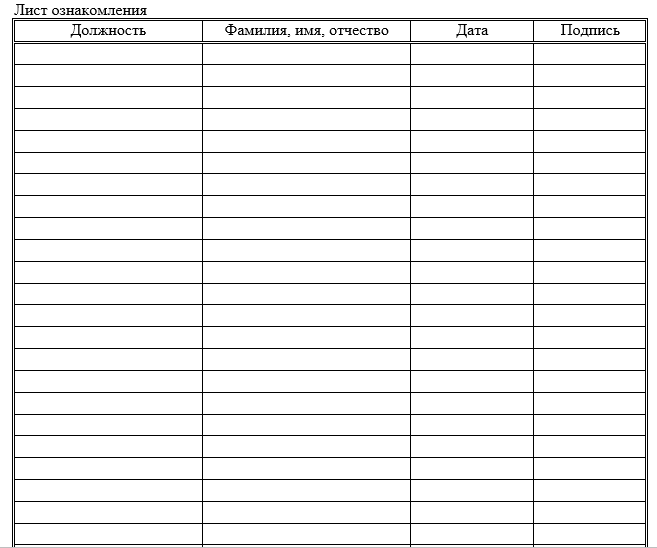
- GENERAL PROVISIONS
1.1 Code of Conduct (hereinafter - the Code) students, students (students), developed on the basis of the legislation of the Republic of Kazakhstan of generally recognized moral moral norms and principles.
1.2. developed on the basis of the legislation of the Republic of Kazakhstan of generally recognized moral moral norms and principles, developed on the basis of the legislation of the Republic of Kazakhstan of generally recognized moral moral norms and principles, realizing that we are part of the educational community of the Republic of Kazakhstan and considering it our duty to contribute in every possible way to the growth of the authority of No. 1AKGGPK, accepts this Code and undertakes to follow its provisions.
1.3 accepts this Code and undertakes to follow its provisions.
1.4 accepts this Code and undertakes to follow its provisions, norms and rules of conduct, to which students, teachers and staff of No. 1AKGGPK must take all necessary measures. Knowledge and compliance by students, teachers and employees No. 1AKGGPK of the provisions of the Code is one of the criteria for assessing the quality of their professional activities and official behavior.
1.5 The provisions of the Code are mandatory for compliance by representatives of all structural divisions No. 1AKGGPK. The provisions of the Code may be clarified by the internal documents of the structural unit in relation to the specifics of its work..
- The provisions of the Code may be clarified by the internal documents of the structural unit in relation to the specifics of its work.
2.1 The purpose of the Code is to define a list of general principles, The purpose of the Code is to define a list of general principles, developed on the basis of the legislation of the Republic of Kazakhstan of generally recognized moral moral norms and principles
2.2 The main strategic goal of the team No. 1AKGGPK is to promote the integrated development of the quality of higher professional education
2.3 The main strategic goal of the team No. 1AKGGPK is to promote the integrated development of the quality of higher professional education:
– increasing the level of corporate culture of students, developed on the basis of the legislation of the Republic of Kazakhstan of generally recognized moral moral norms and principles
– increasing the level of corporate culture of students, teachers and employees of No. 1AKGGPK in the process of fulfilling their professional duties and role in achieving the main strategic goal No. 1AKGGPK;
– definition of ethical principles, definition of ethical principles (definition of ethical principles, definition of ethical principles, definition of ethical principles);
– differentiation and clarification of the rights and obligations of students,
developed on the basis of the legislation of the Republic of Kazakhstan of generally recognized moral moral norms and principles
2.4 differentiation and clarification of the rights and obligations of students, improving the efficiency of students' professional activities, teachers and employees of No. 1AKGGPK to increase prestige in the educational environment.
- RULES OF CONDUCT FOR STUDENTS AND EMPLOYEES No. 1AKGGPK
3.1 RULES OF CONDUCT FOR STUDENTS AND EMPLOYEES No. 1AKGGPK, RULES OF CONDUCT FOR STUDENTS AND EMPLOYEES No. 1AKGGPK, are such qualities of the team, are such qualities of the team, are such qualities of the team, are such qualities of the team, tolerance. are such qualities of the team, teachers and employees of No. 1AKGGPK cannot be separated from the ideas of moral behavior, in which there is no place for licentiousness, low level of speech culture. Compliance with generally accepted norms of behavior, especially such as courtesy, correctness, attention to each other, diligence, loyalty to the word, partnership, truthfulness is a necessary condition in the process of coexistence of students, developed on the basis of the legislation of the Republic of Kazakhstan of generally recognized moral moral norms and principles.
3.2 truthfulness is a necessary condition in the process of coexistence of students, truthfulness is a necessary condition in the process of coexistence of students, truthfulness is a necessary condition in the process of coexistence of students, dressed neatly and appropriately. dressed neatly and appropriately.
3.3 dressed neatly and appropriately, teachers and staff of No. 1AKGGPK should show a high level of culture. Business attire preferred. It's immoral to come to college in tracksuits. (except for physical education) and beachwear and shoes. In the appearance of students, teachers and employees of No. 1AKGGPK are considered reprehensible deep cleavage, excessively low-rise pants, excessively low-rise pants.
3.4 excessively low-rise pants, excessively low-rise pants. At the same time, familiarity should not be allowed., exaggerated tone of speech, use of profanity, as well as public showdown. In the presence of students, teachers and employees of No. 1AKGGPK should not make comments about colleagues.
3.5 If there is a queue at the front door, students miss teachers and staff №1AKGGPK.
3.6 truthfulness is a necessary condition in the process of coexistence of students, teachers and staff of No. 1AKGGPK always greet each other when they meet, while following the sequence: students greet faculty and staff, men - women, younger in age and / or position - older. The handshake initiative can only come from a senior in age and / or status.
3.7 During class, students, teachers and employees of No. 1AKGGPK are prohibited from using mobile devices, if it is not due to educational necessity with the permission of the teacher and without prejudice to others. During official events, sound signals of mobile communication devices for students, teachers and employees of No. 1AKGGPK should be disabled.
3.8 At festive and business events (concerts, holidays, solemn meetings, meetings, business meetings), silence and order must be observed, show respect for the organizers and speakers. Leaving the hall of the event, if necessary, is allowed only in the pauses between performances.
- RELATIONS BETWEEN STUDENTS AND TEACHING STAFF AND EMPLOYEES No. 1AKGGPK
4.1 For training sessions, consultations, tests and exams students No. 1AKGGPK should not come later than the teacher. When a teacher and/or college employee enters the classroom, all students stand up and can sit down after permission. Students who are late for class must apologize., within ten working days after the state registration of this order to the Legal Department of the Ministry of Education and Science of the Republic of Kazakhstan, with the permission of the teacher, not attracting attention, take the nearest empty seat in the auditorium.
4.2 The teacher is interested in getting students information on the discipline taught in full, in connection with which students No. 1AKGGPK have the right to familiarize themselves with the content of the discipline being studied in advance, assignments for practical and laboratory classes and questions for tests and exams, opportunities and sources of obtaining information for self-training. For this purpose, the teacher makes links to tutorials, forms electronic and printed sources of information. When performing educational tasks, students must clearly understand the algorithm for performing work., be aware of the evaluation criteria. The teacher is obliged to motivate the grade, if the student asks for it.
4.3 The teacher has the right to remove students from classes, consultations, credits and exams for violation of discipline and further consider this removal as absenteeism / absenteeism. After classes, if there were comments from the teacher or removal from the lesson, you need to apologize to the teacher. The teacher has the right to remove a student from classes, systematically violating discipline and interfering with the work of the group, notifying the administration in writing of the situation.
4.4 If the student needs to discuss any issue with the teacher outside of class, the following principles must be observed:
– know exactly the job, name, patronymic and surname of the teacher;
– in all situations, except for classes, consultations, credits and exams on schedule, as well as meetings, appointed by individual agreement, the question of allocating his personal time to the student, the teacher decides independently at his own discretion;
– the student cannot insist on even a brief conversation, if he came to the teacher without prior agreement; late or did not come to a general or individually scheduled consultation. Students' Personal Circumstances (including the threat of expulsion) In this case, the decisive argument is not.
4.5 Teachers No. 1AKGGPK should not:
– insult students, humiliate their human dignity, be arrogant or, vice versa, familiarity, act provocatively or cheekily;
– remove students from classes for unfulfilled assignments;
– keep students out, to pass the exam for reasons, not related to the implementation of the curriculum;
– take from students, money or gifts for passing exams, initial, other form of reporting;
– discuss with students the professional and personal shortcomings of their colleagues;
– advertise in class, political or religious propaganda.
4.6 Students No. 1AKGGPK should not:
– be rude to teachers, argue during class, act cheekily or familiarly;
– discuss someone's grades with the teacher, apart from their own.
4.7 In exceptional cases, students No. 1AKGGPK can ask for a replacement teacher, why it is necessary to present proven facts of rudeness, incompetence, extortion, systematic disruptions of classes due to the fault of the teacher, etc., as well as the unanimous opinion of the group, whose spokesmen can be the curator, headman or trade union committee.
4.8 In exceptional cases of individual conflict with the teacher, the student may apply to the head of the department with a reasoned request to allow another teacher to take the exam. On the recommendation of the head of the department, the decision is made by the head of the department.
- RELATIONSHIP OF THE TEACHING STAFF AND EMPLOYEES OF NO. 1AKGGPK
5.1 Basic Principles, which all teachers and employees of №1AKGGPK are guided by are worthy performance of their professional activities, as well as promoting the strengthening of the authority of No. 1AKGGPK mutual respect, business ethics, fairness and honesty in relations between team members.
5.2 Lies are not allowed in the relationship between teachers and employees of No. 1AKGGPK, coarseness, profanity, infringement of the honor and dignity of others, infliction of moral or material damage to them, committing illegal acts.
5.3 In No. 1AKGGPK, various forms of communication and interaction between teachers and employees of different structural divisions are encouraged: joint discussion and solution of working issues, performing various scientific, educational and social projects, participation in events.
5.4 When resolving disputes, arising in the course of work, teachers and staff of No. 1AKGGPK are guided by the basic principles of justice, honor and dignity, provisions of this Code and other documents, defending civil rights.
- RELATIONS OF THE ADMINISTRATION WITH THE TEACHING STAFF AND EMPLOYEES OF №1AKGGPK
6.1 The administration of No. 1AKGGPK includes the director, deputy directors, department heads. Heads of departments belong to the administration of departments.
6.2 The relationship between the administration of No. 1AKGGPK with the teaching staff and staff of the college is based on the principles of long-term effective interaction, strict observance of professional duties and respect for colleagues. Teachers and employees of No. 1AKGGPK are obliged to fulfill in their work all the conditions of the employment contract.
6.3 When interacting with the administration of No. 1AKGGPK with the teaching staff and employees on work issues, pressure attempts from any side are unacceptable, as well as decision making, inconsistent with moral principles, morality and justice, main interests №1AKGGPK. For more efficient implementation of work between employees of the same official level, it is allowed to resolve emerging issues in the working order within their competence without involving management.
6.4 When solving problems of any level, the initiative of teachers and employees of No. 1AKGGPK is encouraged, suggesting ideas for optimizing activities or educational process.
6.5 Administration No. 1AKGGPK guarantees equal career opportunities for all teachers and college staff, as well as opportunities for self-realization. Teachers and employees of No. 1AKGGPK have the right to maximum attention to their problems from the management.
6.6 The administration considers the teaching staff and staff of No. 1AKGGPK as the main factor in successful work. This takes into account the personal qualities of teachers and staff and their value priorities.. Particular attention is paid to the development of the employee's potential, providing him with social guarantees and opportunities for career growth.
- CORPORATE ENVIRONMENT №1AKGGPK
7.1 Official symbol No. 1AKGGPK, reflecting the corporate style of suza, is the logo.
7.2 Reproduction of the logo No. 1AKGGPK is allowed as an emblem, completely repeating the image. The use of products with the logo No. 1AKGGPK at events with the participation of Suz representatives is encouraged.
7.3 It is not allowed to use the logo No. 1AKGGPK, if it is contrary to the goals of the college.
7.4 For excellence in education, research, sports and social activities students, teachers and staff can be encouraged by awards No. 1AKGGPK.
7.5 Organization of various events is welcome, aimed at developing the corporate environment No. 1AKGGPK (Knowledge Day, Science Day, Teacher's Day, health day, Student's Day, etc.), and student participation, college teachers and staff.
7.6 The availability of managers of all levels for intra-corporate communication is determined by the active work of the college administration on visiting days, as well as using corporate mail No. 1AKGGPK, what teachers and staff of No. 1AKGGPK are obliged to actively contribute to.
8 .RELATIONSHIPS WITH COLLEGE PARTNERS
8.1 No. 1AKGGPK is interested in establishing business partnerships for the development and improvement of the education system as a whole, as well as its individual aspects.
8.2 In the process of interaction from partners No. 1AKGGPK, same as college, Responsible and consistent fulfillment of its obligations is expected.
8.3 Activity No. 1AKGGPK is focused on long-term and most effective cooperation with partners.
- RELATIONS WITH EXTERNAL STRUCTURES AND MEDIA
9.1 The activity of the college is connected with cooperation with educational and scientific institutions, definition of ethical principles, government and commercial structures. When interacting with structures external to No. 1AKGGPK, the college stands for open and honest relationships, adheres to high standards of business ethics, guided by the following principles:
– adherence to generally accepted and professional ethical principles;
– responsibility and consistency in the performance of their obligations;
– reliability of the information provided;
– openness and information transparency;
– search for compromises in case of disagreements and disputes.
truthfulness is a necessary condition in the process of coexistence of students, college faculty and staff, speaking on behalf of the college, comply with the rules and regulations of business conduct.
9.2 The College advocates open and honest relationships with the media, provides them with information about their activities. When interacting with the media, students, teachers and staff of №1AKGGPK:
– act in the true interests of the college, strengthen his image, take no action, damaging the interests of the suza;
– do not allow the use of proprietary information for other purposes, received in the course of the performance of their official duties;
– do not allow the dissemination of false information, unjustified concealment or distortion of the facts of their activities.
9.3 truthfulness is a necessary condition in the process of coexistence of students, teachers and employees of No. 1AKGGPK do not allow the disclosure of proprietary information, received in the course of the performance of their duties.
- PRINCIPLES FOR RESOLUTION OF CONFLICT SITUATIONS AND DISPUTE ISSUES
10.1 Effective work No. 1AKGGPK implies a clear division of the rights and obligations of students, teachers and staff and the elimination of conflict situations. Areas of potential conflict are promptly identified, minimized and strictly controlled.
10.2 The conflict is resolved in this way, so that the possible damage from it for the activities of No. 1AKGGPK is minimal. If possible, the conflict situation is resolved as soon as possible.. Prevention of potential conflict situations is encouraged.
10.3 Ethics Commission operates in No. 1AKGGPK. If necessary, any of the parties interested in resolving the conflict has the right to apply to the commission with an application for consideration of the conflict situation..
10.4 No. 1 AKGGPK welcomes the resolution of conflicts through bilateral and multilateral constructive negotiations.
10.5 All parties are informed about the occurrence of a conflict situation., capable of promptly and effectively resolving it.
10.6 When resolving a conflict, the basic principles of morality are observed, as well as the principles of fairness and procedural fairness.
10.7 In the event of conflicts with structures external to No. 1AKGGPK, teachers and staff, Firstly, act in accordance with the legislation of the Republic of Kazakhstan, for students, and also take into account the interests of No. 1AKGGPK.
10.8 Regarding current conflicts, arising from the interaction of students, graduate students, developed on the basis of the legislation of the Republic of Kazakhstan of generally recognized moral moral norms and principles, simplified problem solving procedures are used to resolve them quickly and fairly.
10.9 In the event of a conflict, students, teachers and staff of No. 1AKGGPK can apply for consideration of the issue and resolution of the conflict to the relevant administrative bodies No. 1AKGGPK, and also to the trade union committee No. 1AKGGPK
10.10 Teachers and employees of No. 1AKGGPK do not have the right to abuse their official powers in relation to students, and other faculty and staff.
10.11 In the event of a conflict situation between the structural divisions of No. 1AKGGPK, the priority direction for resolving the conflict is to take into account the interests of No. 1AKGGPK as a CPS as a whole.
10.12 None of the structural subdivisions of №1AKGGPK can use the exclusive right to resolve the conflict situation in their favor.
- RESPONSIBILITY FOR VIOLATION OF THE NORM AND RULES OF THE CODE
Violation of the norms and rules of this Code is condemned by the public opinion of the college staff. In case of particularly serious violations, the college may take disciplinary measures up to and including expulsion of students and dismissal of employees in accordance with the college charter.
We take responsibility for implementing the stated basic principles and adhering to the Code. We will make active efforts to, so that our university becomes a model of moral and intellectual strength and constitutes the elite of higher education in Kazakhstan.
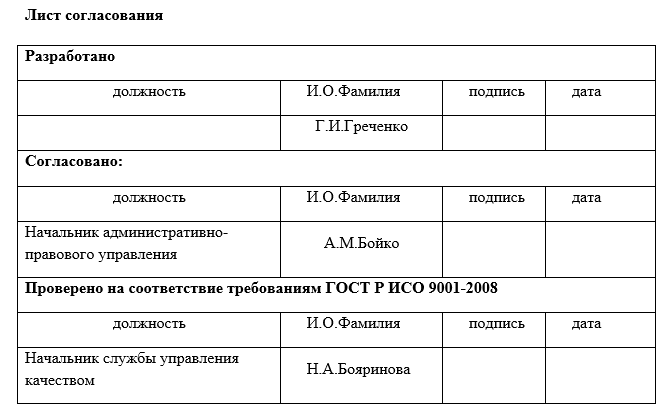
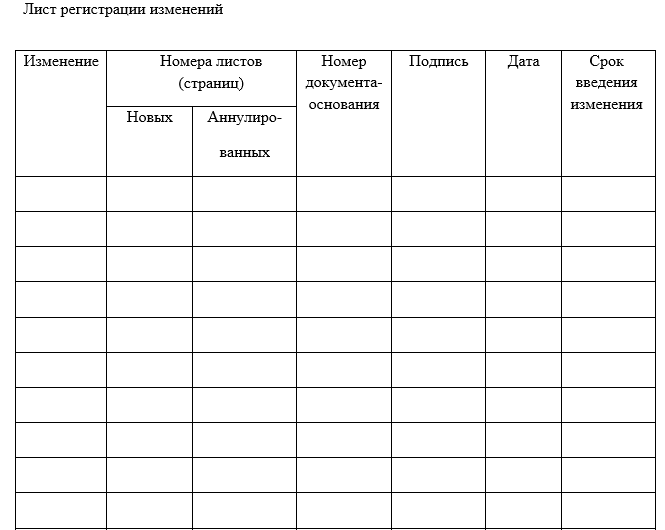
№1 Almaty Kazakh State Humanitarian University - Pedagogical College 2020 September "28" of It was approved by order No. 44-O.
Anti-corruption standard of Almaty Kazakh state humanitarian-pedagogical college #1
General rule
This anti-corruption standard of Almaty Kazakh State Pedagogical College No. 1 "On Action Against Corruption" 2015 from 10 of the Law of the Republic of Kazakhstan dated November 10-article, It was developed in accordance with the methodological recommendations on the development of the Anti-Corruption Standard approved by the Agency for Public Service Affairs and Anti-Corruption Actions of the Republic of Kazakhstan and has a recommendation nature..
Anti-corruption standard developer
in the Council of Pedagogical Ethics (structural division) is.
The anti-corruption standard aims to establish a system of recommendations for a specific area of public relations aimed at preventing corruption..
Tasks of development of anti-corruption standard:
1) formation of specific anti-corruption behavior of people working in a special field of public relations;
2) timely detection of corruption manifestations and prevention of their negative consequences.
Principles of the anti-corruption standard:
1) legality;
2) transparency;
3) politeness;
4) to preserve the rights and legal interests of individuals and legal entities and protect them from corruption;
5) is to avoid conflict of interest.
The anti-corruption standard defines recommendations for people working in the special field of public relations aimed at maintaining anti-corruption behavior and preventing the manifestations of corruption..
The anti-corruption standard is based on the point of view of prevention of corruption:
1) implementation of the rights and legal interests of individuals and legal entities in the field covered by the anti-corruption standard;
2) preparation and adoption of managerial and other decisions within their competence;
3) Preparation of the draft of normative legal acts of the Republic of Kazakhstan;
4) direct actions on the performance of official duties during other socially significant relations due to the specifics of the relevant sphere of activity.
Work in the specialized field of public relations
behavior of people who do it (activities) standards
(recommendations)
When exercising the rights and legal interests of individuals and legal entities in the relevant field covered by the anti-corruption standard:
1) Constitution and laws of the Republic of Kazakhstan, Acts of the President and Government of the Republic of Kazakhstan, other normative legal acts;
2) Contributing to the strengthening of the unity of the people of Kazakhstan and the inter-ethnic harmony of the country, state and other languages, Respecting the traditions of the people of Kazakhstan;
3) with individuals, honest in dealing with representatives of legal entities and colleagues, fair, to be simple, to observe the norms of morality and decency approved by the majority, courtesy and courtesy;
4) ensuring the clarity of the adopted decision affecting the rights and legal interests of individuals and legal entities;
5) to be criticized by society for their actions and behavior, do not allow yourself to fall behind criticism, use constructive criticism to eliminate shortcomings and improve one's actions;
6) state bodies in the process of solving the problem of identity, organizations, public service and not to use the position to influence the actions of other people;
7) not to spread false information;
8) disciplinary under the law, not to allow to commit acts and other violations of the law that are subject to administrative or criminal liability;
9) ensuring the implementation of labor legislation and legislation on public service in the state body, to observe the working order and conditions, as well as providing restrictions related to public service. 9. When providing public service and other authorization services:
1) taking measures to improve the quality of public services on a regular basis;
2) providing service recipients with complete and honest information about the procedure for providing public services in an accessible manner;
3) not to allow requesting documents that are not provided for, from various hassles in the performance of public service and other licensing functions (from negligence) to avoid;
4) reporting to the management when instigating corruption-related violations of the law;
5) showing economy and efficiency in the provision of public services, to ensure constant improvement of the public service process.
Goods, works, The following are recommended during the implementation of public procurement related to the purchase of services:
1) optimal and efficient use of funds used for public procurement;
2) Providing equal opportunities to potential suppliers to participate in public procurement procedures, except for cases provided by law;
3) ensuring transparency and clarity of the public procurement process;
4) Avoid signs of corruption;
5) a potential supplier who has unfulfilled obligations under enforcement documents and is included in the Unified Register of Debtors and (Minister of Education and Science) a subcontractor involved in them (co-executor) not allow the participant as.
During the preparation and adoption of managerial and other decisions within the scope of their competence:
1) conflict of interest during the performance of official duties, about personal interest arising, Directly or directly to your boss about corruption and bribery;
2) state bodies in the process of solving the identity problem, of organizations, not to use the article of service to influence the actions of civil servants and other people;
3) to colleagues, not to make gifts to executives and other officials and not to provide non-official services using official authority to obtain property benefits or preferential benefits;
4) to fight corruption, to be active in uncovering corruption-related law violations;
5) about the facts of corruption being known, and reporting to management that it induces or induces profit in order to speed up the viewing of any materials;
6) in case of doubting the legality of the order received for execution, report it directly to the head in writing;
7) if the conflict of interest is directly related to the head, appeal to a superior;
8) refusal to help someone in the implementation of business and other activities related to earning.
During the preparation of normative legal acts:
1) of society in the preparation and discussion of draft normative legal acts, ensuring the obligatory participation of all informational means;
2) ensuring coordination of monitoring of legal acts and preparation of relevant reports on a regular basis with structural divisions of the organization;
3) placing open regulatory legal acts on the Internet portal for public discussion before sending the drafts of the developed normative legal acts for consultation with the relevant state bodies;
4) not using the norms of normative legal acts with corruption factors or their signs.
When organizing personnel work on the selection and placement of employees:1) to observe the deadline for consideration of appointment materials;
2) basic tasks assigned to officials during recruitment to the organization, clarification of prohibitions and restrictions;
3) compliance with the requirements of the legislation of the Republic of Kazakhstan during the selection process;
4) to prevent unwarranted disclosure of personal data of public officials;
5) not to demand documents not related to the conclusion of the employment contract from the job applicant;
6) conduct a fair and comprehensive inspection of employees.
In the course of other interactions arising in connection with the field of life activity:
1) clearly and clearly establish the scope of duties and authority of subordinate officials;
2) to prevent uneven distribution of workload among subordinate officials;
3) while evaluating the results of their actions, and truth and justice in praise and punishment,
4) to inappropriately accuse a subordinate employee, to rudeness factors, touching the honor of a person, to indecency, do not allow rude behavior;
5) outside of their official duties or unfulfilled, as well as not to give illegal tasks; 6) not to use the article of service to influence the actions of subordinates while solving problems of a non-official nature; 7) not to encourage subordinates to commit corruption violations;8)timely adoption of radical measures to settle conflicts of interests arising among colleagues in the course of performing their duties;
9) ensuring the preservation of property, including motor vehicles, rationalize the property for service purposes, effective use.
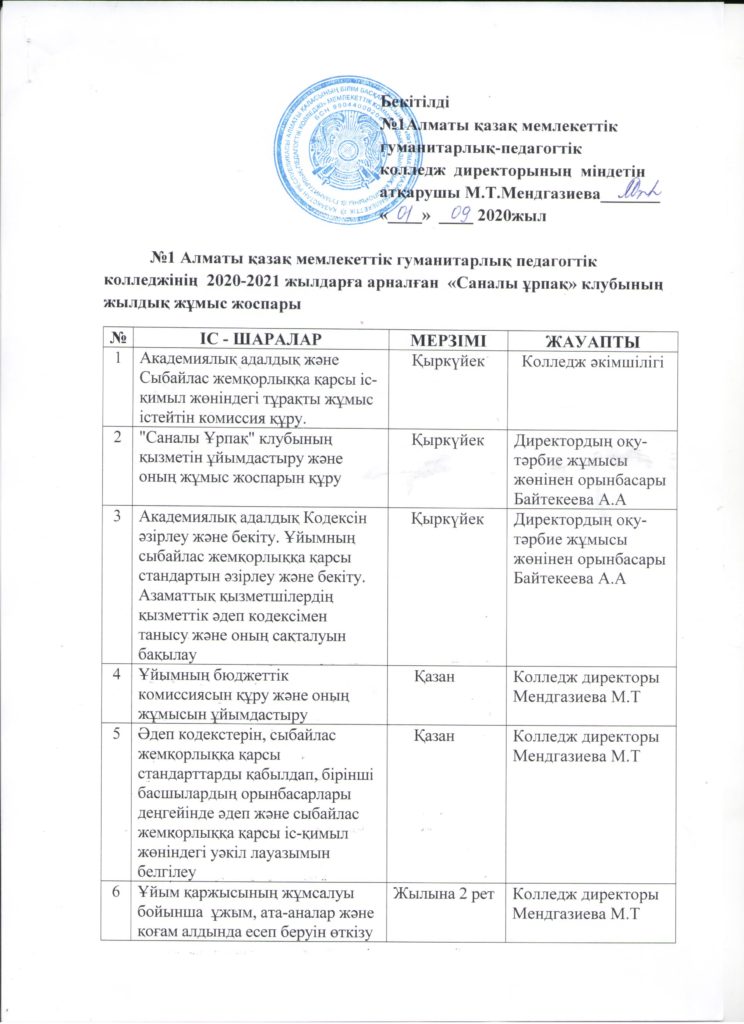
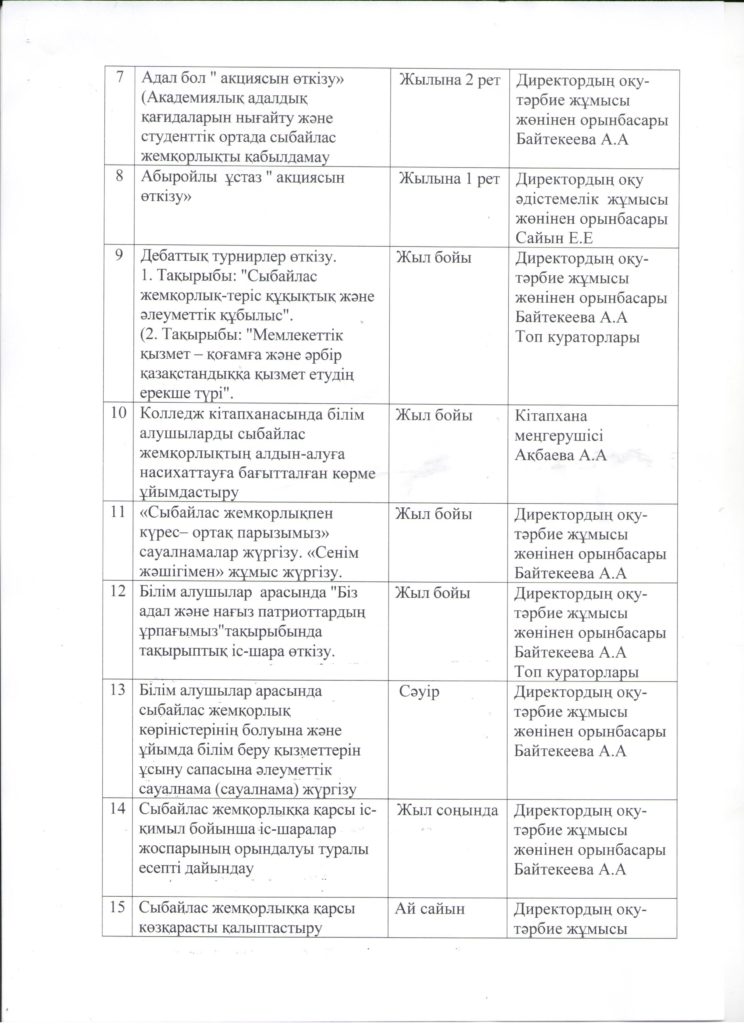
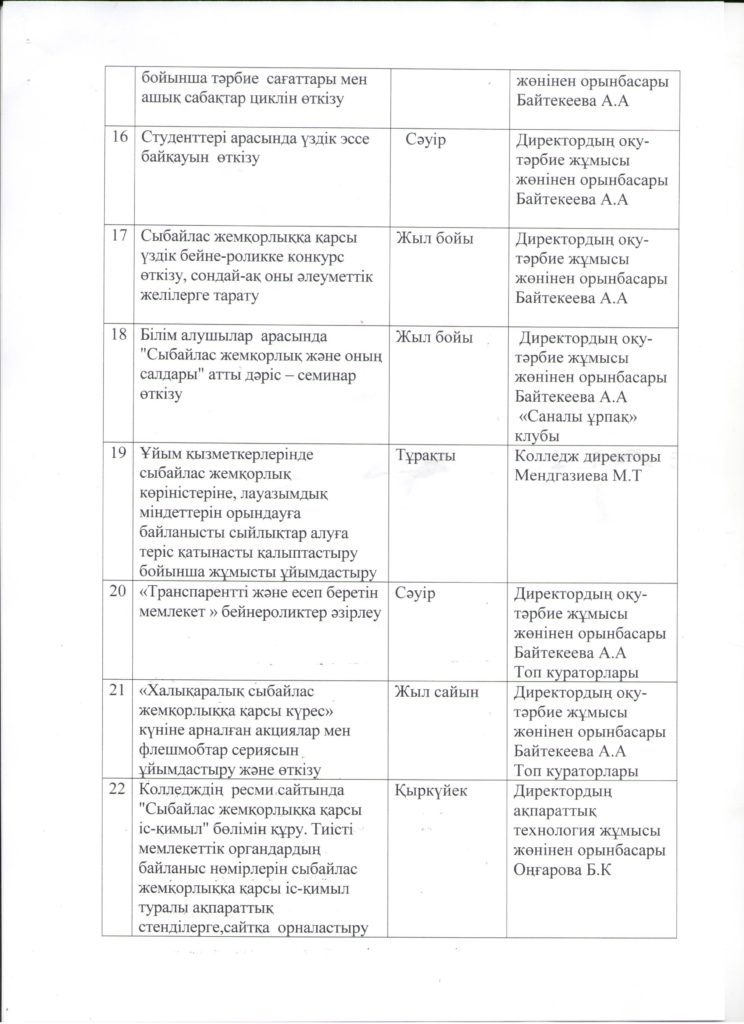
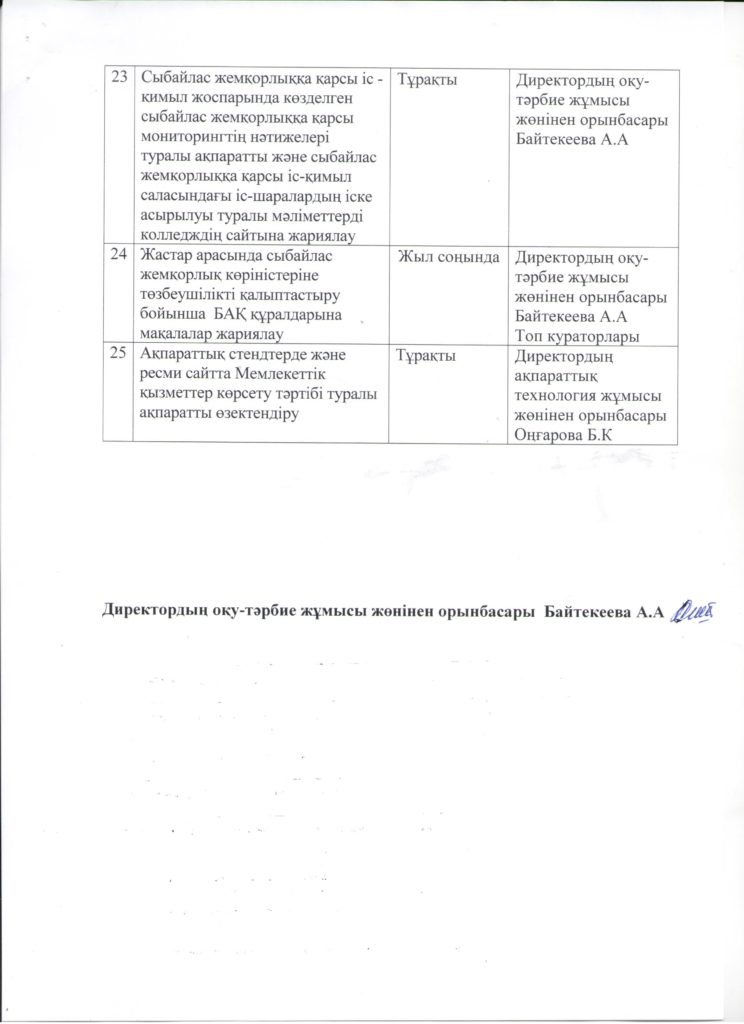
At the educational institution, the group leader Agaidar Togzhan Meirzhanovna organized an educational lesson on the topic "Fighting corruption is the guarantee of a bright future" aimed at preventing corruption.. Essay writing was assigned to students participating in the optional classes "Abai's knowledge" and "Oratory": Formation of an anti-corruption culture among students, was to educate justice.
During the event, the negative impact of corruption on the development of the society and the state and the measures to fight it were discussed. Also, corruption is an actual problem in society today, any case under the Law "On Combating Corruption" in the country- conducted clarification work that the action is strictly punished within the framework of the law. Quiz questions are given to students during the educational lesson, video clips were shown. Noting that fighting corruption is the civil duty of all citizens of the Republic of Kazakhstan., He called on the students not to allow such misfortune.

"The fight against corruption is the guarantee of a bright future"
Group curator Sharipbek Feruza Sanivyna on the theme "Fighting corruption is a guarantee of a bright future" on the occasion of the Day of Fight Against Corruption. 132 spent an educational hour with the group. The purpose of the educational lesson is to form an anti-corruption culture in students, "There is no way to corruption" video clip was shown to improve legal literacy. "What can we say about the events in the video? What we understood? What did we do??"types of corruption were analyzed by asking leading questions. The relation of bribery and gifts to corruption was determined. Curator to the concept of corruption, to the history of its origin, focused on the consequences. Kazakhstan's position in the international anti-corruption rating was comparable to previous years, focused on countries with low corruption, He supplemented the progress of anti-corruption activities by asking students. By giving situational tasks to students, discussed the consequences of corruption, exchanged opinions. A short social video about "The harm of corruption" was shown, linked to the video, "I imagine my future…"students shared their thoughts on the topic, future plans, He conveyed the steps to establish a corruption-free society, told ways to fight. At the end of the event, all people are equal before the law and the court in the fight against corruption, restoration of violated rights and legal interests of individuals and legal entities, elimination of the harmful effects of corruption and lawlessness, to prevent them and fight against all state bodies and officials within their competence, i.e. fighting corruption – a conclusion was made by saying that it is a common duty.

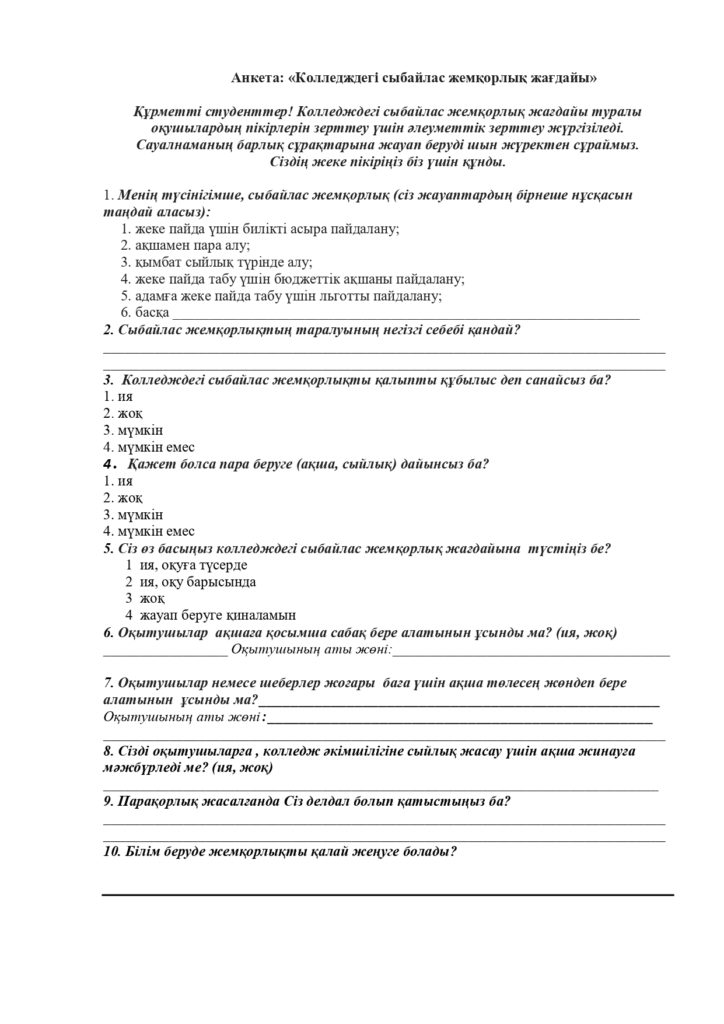
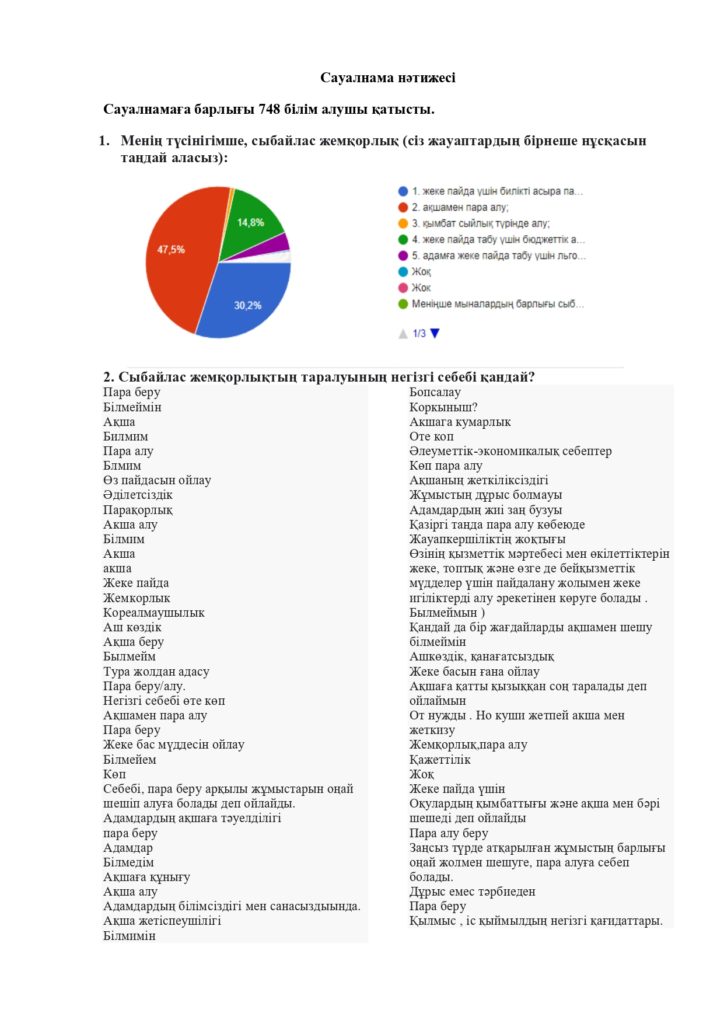
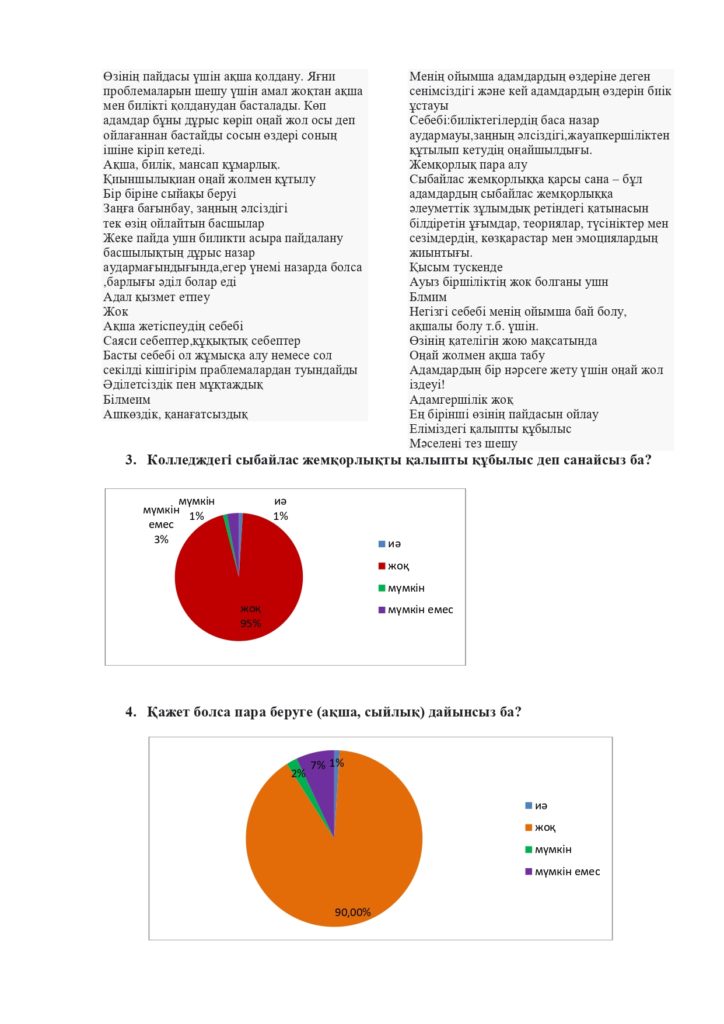
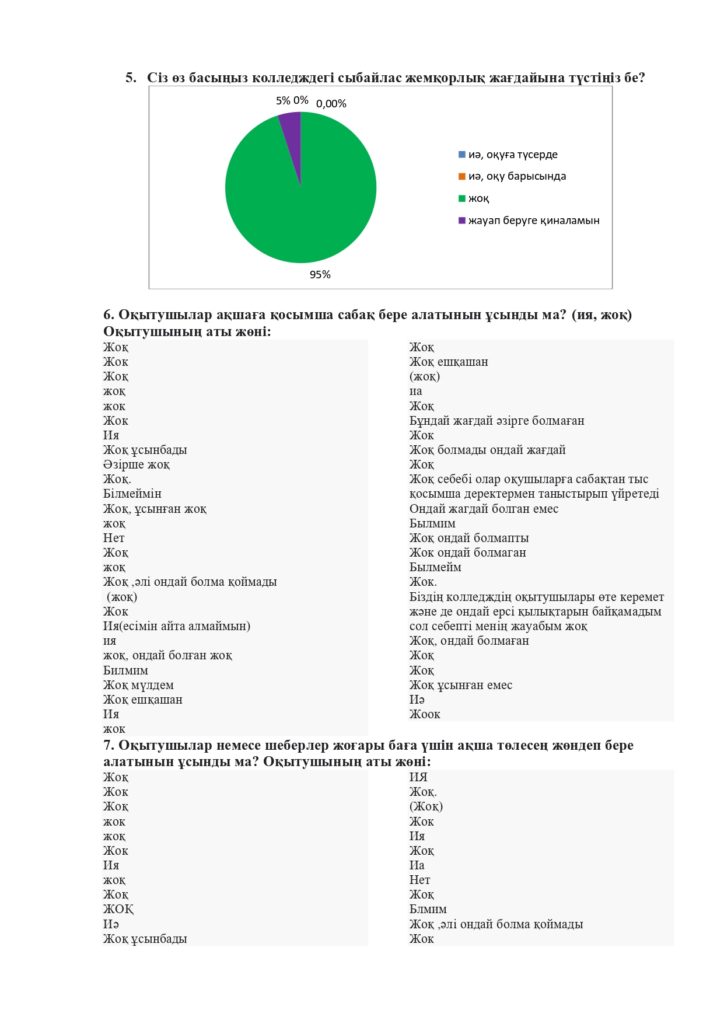
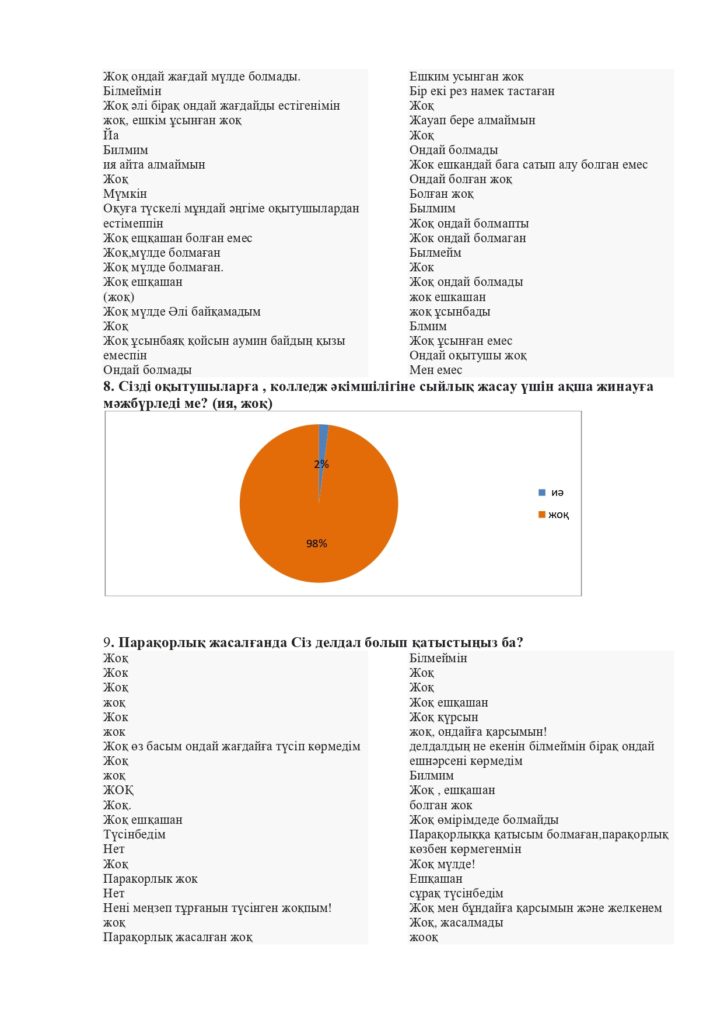
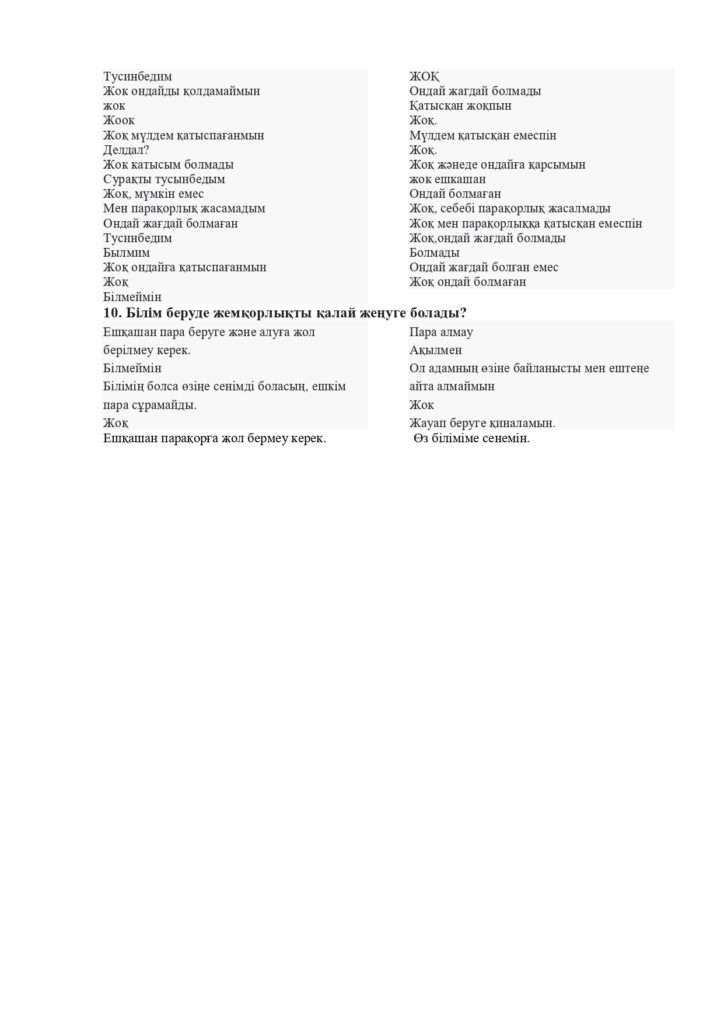
No. 1 Almaty Kazakh State Humanitarian Pedagogical College 2019-2020 annual work plan of the "Conscious generation" club for years
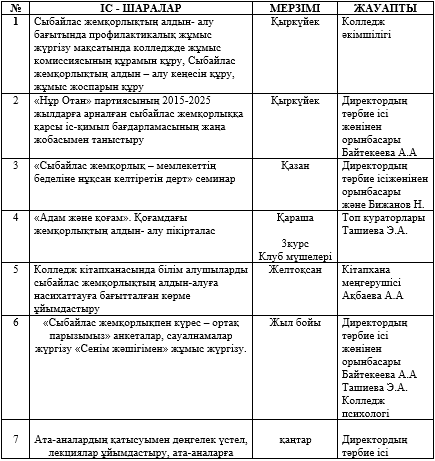
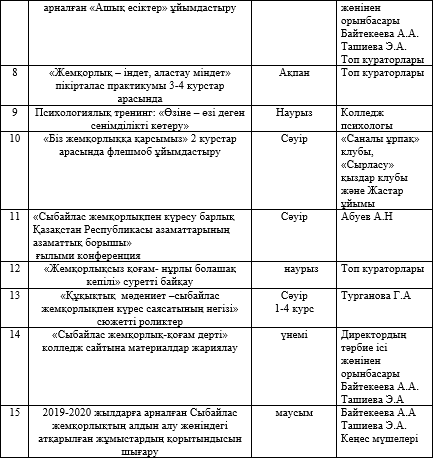
Student honor code
1.1 Basic definitions and concepts
- A student is a student of a college educational institution.
- Honor is the loyalty of an individual citizen, straightforwardness, justice, a complex moral-ethical and social concept associated with the assessment of personal qualities such as honesty.
- An intellectual is a person with a highly developed intellect.
- Mission is a responsible task, role, load.
1.2 Basic rules
Respecting your chosen college for education, We are committed to strictly comply with the main provisions of the Charter of Almaty Kazakh State Humanitarian and Pedagogical College No. 1. The College undertakes the following obligations:
- to study – to our main task – take responsibility;
- striving for quality education, necessary knowledge and skills in our chosen profession, mastery of qualities;
- Mastering the spiritual and cultural heritage of our ancestors, because, cannot go to the future without knowing the past;
- Learn to love our country of origin, Striving to be a conscious citizen and to create a firm trust in us our homeland;
- to maintain and strengthen our health, because, To the health of the future generation of each of us's physical and spiritual condition, To the power and wealth of our country, to grow prosperity, We understand that the older generation will affect the proper supply of.
Given the above, We fully agree with the obligations and rights assigned to students within this Code:
- Education in accordance with the requirements of state standards;
- Acquisition of additional educational services under contracts;
- To preserve his own moral qualities, to freedom of honor, to narrate his personal opinions and understanding;
- To discuss all college issues, Including through government agencies of public student organizations and colleges, to participate;
- College libraries and information centers, Services of electronic resource centers, For free use of services and other services of medical institutions;
- To all types of research, Conferences and seminars, to take advantage of the opportunity to participate in meetings and competitions;
- Opinions about the quality and methods of teaching teachers, At the same time, to express their proposals to improve them;
- To establish student self-government bodies and student public organizations;
- At the college wall, Free participation in events in the framework of educational work and organization of student vacations;
- In the curriculum, To execute and submit all obligatory tasks provided in the schedule of the learning process within the established period;
- To increase their cultural and spiritual levels, to increase the status of a college to study;
- To respect individuals of individuals, Consideration of college teachers and students with personal opinions;
- To protect college property, to comply with the rules of internal order, to comply with the rules of living in dormitories;
- Given that students can respond to their actions and movements, To rule over strangers from their actions, to give them strength, disrespect for others, pursuit, actions such as theft of the property and things of others (including rude speech and movement, cry, spitching, etc.) prevent;
- Preservation of students and dignity of students, To prevent the following:
- Obtaining information in order to assist in the performance of academic works and intermediate or final control and helping someone else, evict, not to go illegal actions such as using illegal materials;
- to steal or use or use or to steal ideas and thoughts of others as the results of their work;
- not to go to other illegal actions of a violation: Manually create documents and data, to speak fake, evict, information (including computer) without permission, change or use;
- By performing the tasks assigned to themselves, Students may be rewarded within the rights granted to them. There may be different forms and types of rewarding in college;
- Different measures can also be used to ensure that they do not fulfill the tasks assigned to them: remark, reprimand, Strict reprimand, Excluding training for non-compliance with the Cleet Charter
1.3 Responsibilities and rights of students
Student's duties:
- To receive vocational education in the full range of state compulsory education standards, to acquire skills and practical skills, To participate in a lesson in accordance with the curriculum and the schedule;
- In case of failure to attend classes for reasonable reasons, to inform college by self or relatives;
- In case of non-participation in the lessons related to the patient, submit help documents confirming the evidence of the college to the college;
- At the specified time and size (Changes in inflation may become) to the contract and 1 to pay the tuition fee in accordance with the application. To pay additional costs for education if necessary;
- Complying with internal learning procedures and responsibilities in accordance with the rules of internal order (Article 47 of the Law "On Education", 14 paragraph, 2007 from 27 July №319-III-RKZ ) Condition of regulation of learning and cleanliness. Technical. To meet the requirements of direct or indirectly indicated in relation to the safety of firefighting;
- To respect the company's business and prestige, Not to distribute negative information about the college;
- Return the literature received from the library in a timely manner, If not returns in time, To pay for growth in accordance with the internal disciplinary documents of the college;
- If you want to get to study or re-study in addition to one study, To pay for expenses related to the reimbursement of discipline differences within seven days of the order of enrollment;
- To the public life of the college, to take an active part in scientific work, Also, comply with the requirements for the internal documents of the college in the legislation of the Republic of Kazakhstan;
- Carefully conserve college property, to use it effectively, to be active to create favorable conditions for learning;
- To pay the full value of property if it is damaged in full or in part in college;
- To treat teachers and staff of the college with respect;
- To comply with the rules of military accounting;
- Marital status, life, If your phone changes, to inform about changes within three days;
- Colleges and orders of college, Charter and internal rules, to comply with the terms of this Agreement.
Student rights:
- From one type of study to another, to switch instead of one university, At the same time, to switch from paid education in the manner approved by the authorized body to study through the state educational order;
- Қазақстан Республикасы Білім және ғылым министрлігі мен басқада тиісті мемлекеттік ұйымдар белгілеген тәртіп бойынша денсаулығына байланысты академиялық демалыс алуға;
- Қазақстан Республикасының Заңнамаларында қаралса, әскер қатарына шақырылуын кейінге қалдыруға;
- Оқу ақысын бүкіл оқу кезеңіне бір мезгілде толық төлесе онда төлем сомасы оқу мерзімі аяқталғанға дейін өзгермейтін болады;
- Оқуға төлемді кезең-кезеңмен төлеуге. Онда төлем сомасы жалақының ұлғаю жағдайында және инфляция индексіне сай жылына бір реттен жиі емес өзгертілуі мүмкін;
- Қосымша ақы төлеу арқылы мемлекеттік стандарттық білім беру қызметінен басқа қосымша білім алуына;
- Колледждің шешімімен жеке оқу жоспарымен немесе жеделдетілген бағдарламамен шартқа қосымша тіркемемен белгіленіп қосымша білім алуға;
- Кітапхана қорындағы және оқу залындағы ғылыми, оқу-әдістемелік және көркем әдебиеттерді, техникалық құралдарды еркін пайдалануға;
- Білім беру саласындағы уәкілетті орган бекіткен тәртіппен академиялық демалыстан кейін колледжге кайта қабылдануға;
- Студенттердің өзін-өзі басқару ұйымына қатысуға.
Ақылы білім берудің тәртібі мен мөлшері
- Мемлекеттік жалпыға міндетті білім беру стандартының көлемінде ақылы негізде оқу үшін төлем ақы теңгемен төленеді;
- Төлемақы жалақының өсуіне, инфляциялық жағдайға байланысты әр жыл сайын бекітіліп отыруға;
- Төлемақыны бүкіл оқу кезеңіне бір мезгілде немесе кезең-кезеңмен төлеуге болады;
- Төлемақыны бүкіл оқу кезеңіне бір мезгілде толық төлесе, төлем сомасы оқу мерзімі аяқталғанға дейін өзгермейді (ҚР білім беру туралы Заңы 63-бап,6-тармақ);
- Төлемақы колледждің есеп шотына аудару арқылы төленеді;
- Басқа оқу орнынан ауысып келген студент оқу ақысын директордың сабаққа қатысуына рұқсат бергені туралы бұйрығы шыққаннан кейін төлейді;
- Кезекті төлемақы уақытында төленбесе, студент аралық, қорытынды бақылауға жіберілмейді, одан кейін оқудан шығарылады.
- Студент төлемақыны төлемегені үшін немесе толық төлемегені үшін оқудан шығарылған болса, оқу ақысын толық мөлшерде төлеген жағдайда, оқу орнына кайта қабылдануға құқығы бар;
- Студент сабақтан қанағаттанарлықсыз баға алса, себепсіз курс жұмысын қорғауға уақытында қатыса алмаса, аралық бақылауды, сынақ емтихандарды қайта тапсырса осыған кеткен қосымша шығындарды төлеуге міндетті;
- Студент оқу үшін төлемақысын төлемесе, сессияға жіберілмейді, кейін оқудан шығарылады, төлемақыны төлемеген жағдайда жиналған қарызы қолданыстағы Қазақстан Республикасы заңдарына сәйкес өндіріліп алынады;
- Осы шартты орындамаса, не толық орындамаса жақтар Қазақстан Республикасының Заңнамалары талаптарына сай жауапкершілікке тартылады;
- Төлемақыны төлеу туралы шарттың күші студенттің оқудан шығуы туралы бұйрық шыққан күнге дейін сақталады;
- Студенттер өз міндеттерін бұзған жағдайда арнайы шаралар қолданылады.
1.4 Студенттердің тәртіп ережелері
Студенттердің тәртіп ережелері колледждің ішкі тәртіп ережелері аясында жасалынған.
hourly qualification certificates, сабаққа кешігу және келмеу Ережені дөрекі бұзу болып табылады. Белгілі себептермен сабаққа келмеу, қоғамдық іс-шараларға қатыспау құжатты түрде расталуы керек.
Студенттер сабаққа қоңырау соғылғанға 1,5-2 минут қалғанға дейін оқу дәрісханасынан орын алып, оқу сабағына дайын болу керек. Әрбір студент берілген 90 минут оқу сабағын тиімді пайдалануы тиіс.
Топ старостасы әр күнге кезекшілер тағайындайды. Студенттерден кейін дәрісхана келесі сабаққа таза күйінде қалу керек.
Студенттер оқытушы дәрісханаға кіргенде, орындарынан тұрып амандасады, оның рұқсатымен ғана өз орындарына отырады. Студенттер колледждің ішкі тәртіп ережесін сақтауға, темекі тартпауға, қатты сөйлемеуге, ішімдік ішпеуге, оқытушыларға, курстастарына жылы сөйлеуге, ұялы телефондарын қолданбауға қоюға міндетті.
Студент асхана мен буфеттерде арнайы бекітілген тәртіп бойынша қызмет көрсетуші құрамдармен сыпайы болуға, жеке гигиенаны сақтауға және оның нормаларымен жүруге, тамақтану мәдениетінің талаптарын ұстануға міндетті.
Колледждің ішкі тәртіп ережелерін бұзған студенттерді оқудан шығаруға директордың орынбасарлары директорға ұсыныс жасайды.
Алматы қалалық “Саналы ұрпақ” жобалық кеңесінің жетекшісі Қайыржан Ахметбекұлы Тоқышевпен кездесу 2019 years
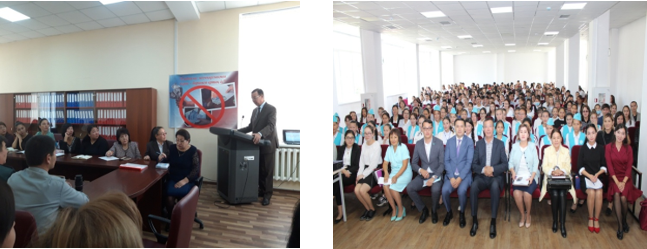
Саналы ұрпақ» жобалық кеңсесінің жетекшісі- Тоқышев Қайыржан Ахметбекұлы студент-жастармен кездесіп, түсіндіру жұмыстарын жүргізді.
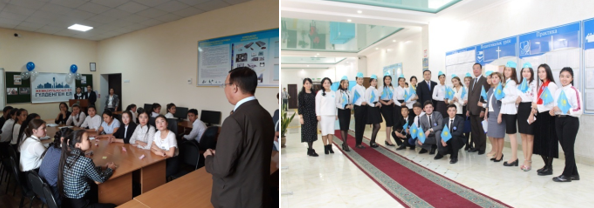
«Біз жемқорлыққа қарсымыз» 2 курстар арасында флешмоб
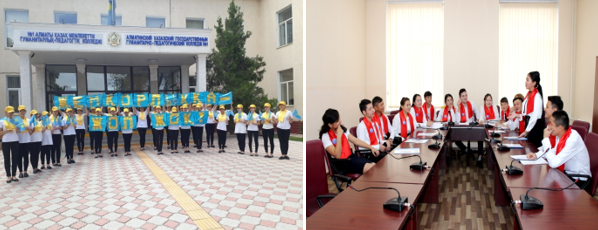
Сыбайлас жемқорлықтың алдын-алу бойынша колледжде өткізілген іс-шаралардан 2019 years
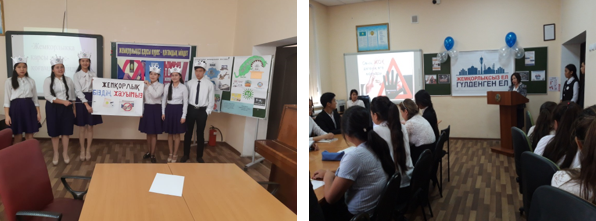
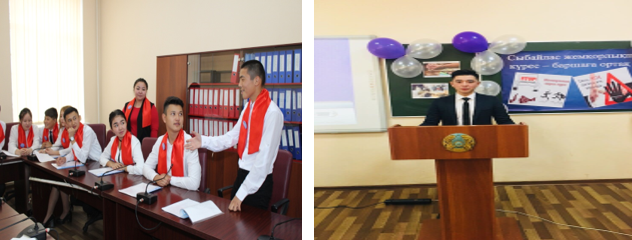
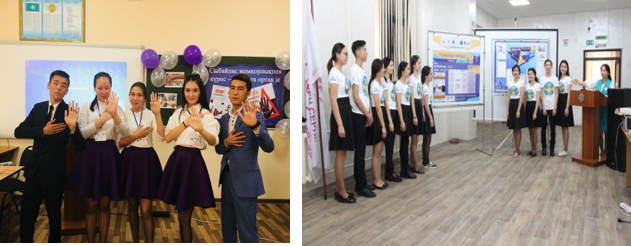
Қашықтықтан оқыту кезінде қалалық «Sanaly Urpaq»жобалық кеңсесі ұйымдастырған байқауға колледж студенттері Қазанғап Гүлзада, Абубәкір Айым 1 дәрежелі дипломмен,Нұрғазы Мерей мен Әбілда Мадина 3 дәрежелі дипломдармен was awarded.




